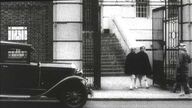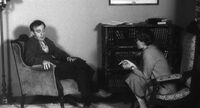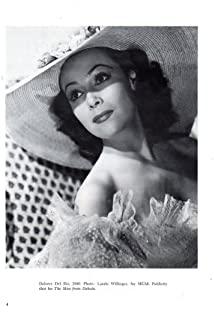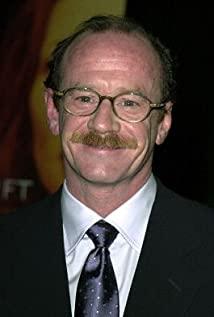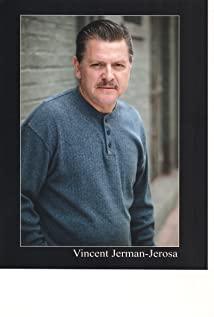Allen's '80s black-and-white features x 2, ZELIG is a gimmick film, a mockumentary germinated from the inventive idea of a “human chameleon”, but the real star is DP Gordon Willis' Promethean genius of inserting characters into archival footage and the application of rendering the newly shot footage a '20's archival veneer, to the astonishing effect of total harmony and verisimilitude (although the one with Hitler is a bust, the actor's resemblance is wide of the mark), and to that purpose, ZELIG is an exceptional specimen of cinematic alchemy.
Structure-wise, the whole pseudo-documentary format is devised with the full treatment, like Bob Fosse's raw and edgy biopic LENNY (1974). Apart from punctiliously coaxed archival footage, retro-style home videos, Allen also uses real-life personages and actors (who play the fictional characters) to give their candid interviews of the subject, you almost believe what they say if the words are spoken from Susan Sontag or Saul Bellow, among other authority figures.
That said, ZELIG's technical extraordinariness (include half a dozen coined Zelig-themed songs penned by Dick Hyman, that can surely widen your smile) cannot belie the script's prevailing plainness and archness, it is a missed opportunity for Allen not to fully satirize and assess Zelig's rise-and-fall in relation to the American society at large and elicit more heady reverberations.
Allen plays Leonard Zelig, a mousy, anonymous guy who can transform his appearance according to his surroundings (Allen is not equipped to show you an actual transformation process, what you get is the simple outcome, he can be black, oriental, Hebrew or corpulent , in correspondent with those who are near him), and becomes a national sensation for his inexplicable "super power", a cash cow for his instant family, but as an individual, he is miserable and neglected, eventually Zelig's psychological condition is cured by psychiatrist Dr. Eudora Nesbitt Fletcher (Farrow), through quite a lot psychobabble and mesmerism.
When the story heads to a romantic direction, it betrays Allen's own limits, not everything ought to be nailed down with a man making a conquest of a woman's heart. Plus the final trans-Atlantic aviation exploit is so far-fetched that he doesn't t even care to arrange any visual stunt to validate that cockamamie bilge. With its succinct length (79 minutes), ZELIG soars high but crash-lands with a whimper.
BROADWAY DANNY ROSE, released one year after, is about another Allenesque character, Danny Rose (Allen), a talent agent touts unpopular entertainers (balloon formers, a musician working with glasses, a stuttering ventriloquist, just to name a few). When one of his clients, a washed-up lounge singer Lou Canova (Forte, a hearty fellow) has a career revival due to the nostalgic fad, Danny needs to act as a beard of Lou's mistress Tina Vitale (Farrow), so he can bring her to attend Lou's big gig in the presence of Milton Berle (as himself), it could be a real breakthrough.
But Tina is not a meek kitten, and this innocuous act backfires, after unwisely go to a party of her ex-Italian lover, Tina and Danny soon are on the run from mafia hitmen. As a self-proclaimed landlocked Jew, Danny is foisted to go aboard a ship (how atrocious!), and later, he and Tina must wiggle their way out of being tied up together (who can stand the torture of upward-and-downward close movements?). But there is another hammer blow awaits Danny when they're out of harm's way, does anyone wonder why he always scrapes the barrel?
Allen is his usual gabby alter ego, you might feel amused or scream “shut up” for his persistent quotes of his Jewish relatives and his penchant for “asking permission to interject”. Against her type, Farrow smartly plays this superstitious Italian broad with forcefulness and ambivalence, plus a layer of her uncharacteristic va-va-voom. Tina is a shallow woman, in the same sense that Lou is a shallow man, but after encountering Danny, she is transformed, even sublimed by his immanent kindness and sophistication ( and being the high priest of sapio-sexuality, Allen actually put the exact words into Tina's mouth), her guilt conscience overcomes the temptation of life on easy street, she becomes a fuller human and Danny's equal.
Here, the frame device is a gathering of several comedians (Jackie Gayle, Morty Gunty, Corbett Monica, among others) lunching at New York's Carnegie Deli, and Danny's story is recounted as an anecdotal divertissement, Allen always has a knack of such trimmings ( remember the Greek chorus in MIGHT APHRODITE, 1995), and both ZELIG and BROADWAY DANNY ROSE has style, scale, wit and profuse amity and gags in offer, they are among Allen's most innovative works and can put you under a nostalgic spell of the halcyon days.
referential entries: Allen's THE PURPLE ROSE OF CAIRO (1985, 8.2/10); BULLETS OVER BROADWAY (1994, 8.1/10); Bob Fosse's LENNY (1974, 8.6/10).
Title: Zelig
Year: 1983
Country: USA
Language: English, German
Genre: Comedy
Director/Screenwriter: Woody Allen
Music: Dick Hyman
Cinematography: Gordon Willis
Editing: Susan E. Morse
Cast:
Woody Allen
Mia Farrow
Deborah Rush
Mary Louise Wilson
John Rothman
Susan Sontag
Saul Bellow
Peter McRobbie
Rating: 7.4/10
Title: Broadway Danny Rose
Year: 1984
Country: USA
Language: English
Genre: Comedy
Director/Screenwriter: Woody Allen
Music: Dick Hyman
Cinematography: Gordon Willis
Editing: Susan E. Morse
Cast:
Woody Allen
Mia Farrow
Nick Apollo Forte
Edwin Bordo
Paul Greco
Frank Renzulli
Gina DeAngeles
Herb Reynolds
Sandy Richman
Gerald Schoenfeld
Olga Barbato
David Kieserman
Sandy Baron
Corbett Monica
Jackie Gayle
Morty Gunty
Will Jordan
Howard Storm
Jack Rollins
Milton Berle
Rating: 7.5/10
View more about Zelig reviews





